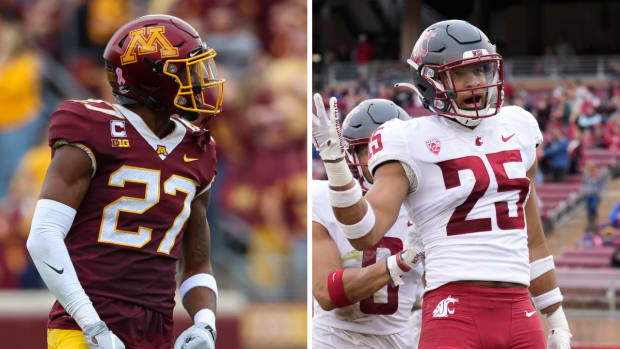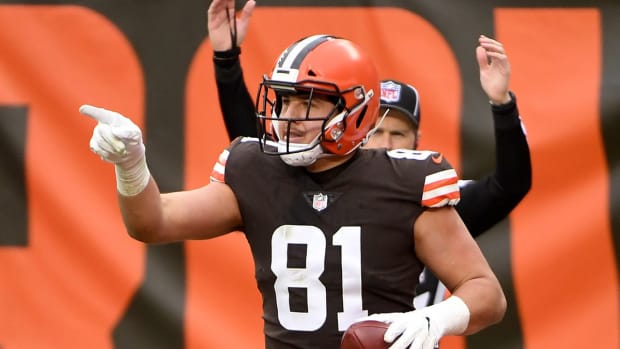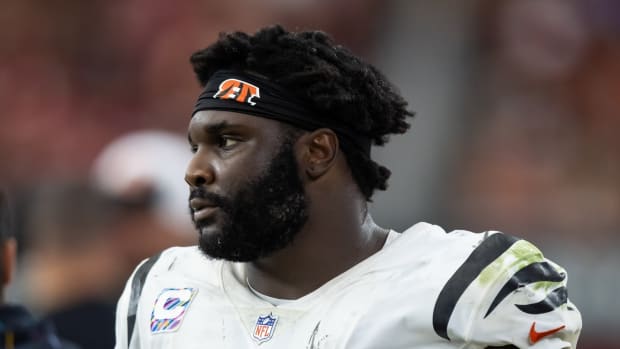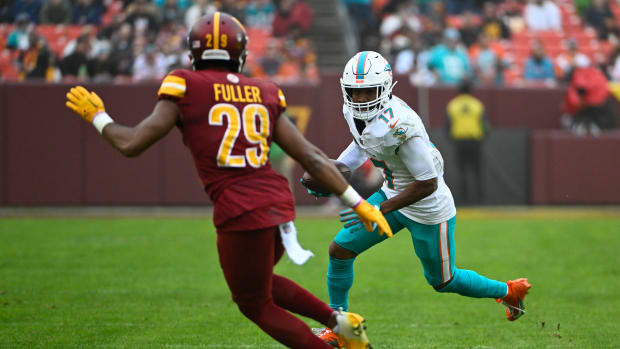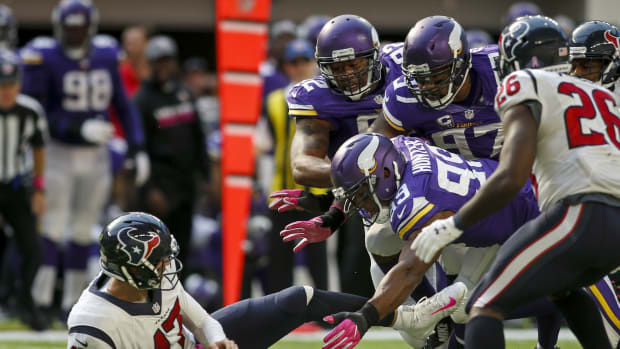The NFL's 10 Biggest What-Ifs of the Last 10 Years
We are conditioned as human beings to relive the past, even though any spiritual advisor or truly enlightened guru-type would advise that the here and now is more critical for personal happiness.
Sports are one of the few aspects of life where revisiting the how and why of something can be enjoyable and somewhat healthy. There were good times. There is room to speculate. There are conversations to be had with old friends and new. That’s why we’re here today, to facilitate such conversations in the absence of football on the near horizon.
The last decade of NFL football has brought us some universally incredible moments. But for fans of some teams in particular, it has also brought the kind of fortunes that make us wonder….
WHAT IF….
1. Chip Kelly got Marcus Mariota?
The Eagles had the 20th pick in the 2015 draft, following a 10-6 season that left them just out of the playoffs. Jameis Winston was the first player off the board, and there was rampant speculation that Kelly would trade up for the QB who he had coached to a 12-1 record during his freshman year at Oregon. The Eagles reportedly went as high as offering the Titans two first-round picks (2015 and 2016), a second-round pick (2015), “any quarterback on their roster and any defensive player on their roster” to trade up to No. 2. That, by the way, would have included Sam Bradford and a potpourri of extraordinarily talented defensive personnel, like Fletcher Cox.
If the Titans had swung the deal, it would have most certainly guaranteed Kelly more than one partial remaining season in town. In addition, it would have prevented the Eagles from hiring Doug Pederson and it could have eliminated part of the valuable player core that won the team its first Super Bowl in 2017.
In Tennessee, that might have meant a longer tenure for general manager Ruston Webster, who was let go at the end of the 2015 season. The organization, then, may have missed out on hiring Jon Robinson as general manager, which would have meant having a harder time recruiting someone like Mike Vrabel to run the team.
It could have also worked for the Eagles, though I say this as an admitted Kelly evangelist. I remain convinced that Marcus Mariota, the reigning Heisman Trophy winner on draft day, was one friendly offensive system away from actually becoming a top-12 quarterback in the NFL. The “power spread” as Kelly dubbed it, was designed to take advantage of teams that needed to constantly shift defensive personnel, trapping a smaller team on the field against two barreling running backs (DeMarco Murray and Ryan Mathews) or trapping bulkier personnel on the field against a fleet of faster skill position players.
2. The Jets drafted Russell Wilson?
Terry Bradway, who was the Jets’ GM from 2001-06 and remained with the team in a senior personnel role for a long time, loved Wilson so much that the draft room jokingly referred to him as “Russell Bradway.” That 2012 season featured a truly bizarre display of Jets quarterbacking (which is saying something), with Mark Sanchez and Greg McElroy both taking snaps under center alongside the ill-fated “Tebowcat” offense that produced six completions for 35 yards and 102 rushing yards. While Rex Ryan would survive two more seasons, this was proof that his act had worn thin. His inability to develop a quarterback—something that would dog him throughout the remainder of his career—and penchant for getting in his own way was never more on display. Wilson, meanwhile, went on to make the first of his seven Pro Bowls in his rookie season and the Seahawks throttled the Jets 28-7 in Seattle that year.
If the Jets had drafted Wilson that year, maybe instead of Stephen Hill in the second round, or by trading up three picks in the first round and nabbing Wilson instead of DeMario Davis, the consequences would be astounding.
Gone, theoretically, is the Seahawks’ 2013 Super Bowl (and NFC title the following year). Matt Flynn is the quarterback of the early 2010s in Seattle. Geno Smith’s draft day slide in 2013 continues, perhaps, for another 30 or so picks until the Seahawks were up (hey, Smith is Russell Wilson’s backup after all). Rex Ryan is still in New York and Sam Darnold is playing in … Buffalo.
3. Robert Griffin III never got hurt?
Griffin was never the same physically after a brutal LCL injury he sustained in the 2012 playoffs, capping a phenomenal Rookie of the Year season. There was debate about whether or not Mike Shanahan had the medical green light to clear Griffin after he sustained the initial hit that sent him to the sidelines in the first place. Either way, the injury peeled the curtain back on a load of palace intrigue in Washington D.C., including owner Daniel Snyder’s irresponsibly fawning treatment of the star passer and the corrosion that took place in the locker room as a result.
If Robert Griffin III remained healthy, who knows what would have happened? For one, Kyle Shanahan’s star would not have taken as long to rise. This was a loaded coaching staff that included Kyle Shanahan, Matt LaFleur and Sean McVay. Had Washington pieced together another solid campaign in 2013 (perhaps at the expense of Chip Kelly’s first-year Eagles), Shanahan may have entered the 2014 coaching carousel as a hot name, working against a relatively weak class that included Ken Whisenhunt, Lovie Smith and Mike Pettine as some of the bigger hires (Pettine would go on to hire Shanahan as his offensive coordinator). Mike Shanahan would have almost certainly remained in power in Washington, costing Jay Gruden the chance to matriculate east from Cincinnati and, because everything comes back to Kelly, the former Eagles coach may not have been fired after one dismal season on the job in San Francisco, where he landed after getting fired in Philadelphia.
Never mind the far-reaching effects of Shanahan’s offense and his coaching tree exploding earlier, instead of the way it has in more recent years. Maybe McVay’s ladder or Matt LaFleur’s rise are altered significantly, which fundamentally reshapes the power structure of the NFC.
Last, but not least, there is Kirk Cousins, who was drafted the same year as Griffin and emerged as a more-than-capable starter once Griffin went down. If Cousins remained as Griffin’s backup, he would’ve hit the free agent market in 2016 or 2017, instead of playing two seasons on the franchise tag. If he was not kept in Washington, Cousins would have hit the market at a time when both the Rams and Eagles were desperate for franchise quarterbacks (and traded up to draft Jared Goff and Carson Wentz, respectively). Paxton Lynch was also a first-round pick and Christian Hackenberg went in the second round to the Jets who, if you’ll remember correctly, were interested in Kirk Cousins a year later when he actually hit the open market and signed the league’s first fully-guaranteed deal with the Minnesota Vikings.
4. The Eagles hired Ben McAdoo?
It’s early 2016 and all feels normal with the world. The Giants have finally moved on from Tom Coughlin and both he and his deputy, Ben McAdoo, are interviewing for the Chip Kelly (there he is again—drink) vacancy in Philadelphia. Here’s ESPN insider Adam Schefter handicapping the Eagles’ gig in January (via NJ.com):
"I don't know that [Pederson]'s the front-runner," Schefter said Wednesday during his weekly appearance on 97.5 FM The Fanatic with Anthony Gargano. "I know that he's square in contention for that job, I know they really like him. In my mind, my sense—these are just senses—is that Ben McAdoo is the front-runner. But I don't know that to be right. I think Pederson and McAdoo both are square in the conversation.”
McAdoo was famously turned around on I-95 en route for a second interview with the Eagles to accept the Giants’ head coaching job and birth the greatest Big Suit since David Byrne and the Talking Heads.
If the Eagles had hired McAdoo….
I believe, based on some of my own intel, that the Giants would have hired former Falcons head coach Mike Smith.
I believe, based on my own first-hand knowledge of Philadelphia, that the city would have either wholeheartedly embraced big suits or ripped him mercilessly, far more than the ridicule McAdoo sustained in New York.
The most famous play in Eagles history, the Philly Special, would have instead morphed into to an endless stream of goal line fades.
Without McAdoo in New York, we probably wouldn’t have seen a premature end to Eli Manning’s consecutive games played streak. The boat incident in Miami possibly never happens. Doug Pederson maybe returns to the Chiefs for another year of seasoning (the Eagles were Pederson’s only known interview in 2016) until the Andy Reid tree gets red hot. He then bursts onto the scene in 2017 with openings in Denver, Buffalo, Jacksonville, Los Angeles, San Diego and San Francisco.
5. The Bears drafted Patrick Mahomes or Deshaun Watson?
I don’t think this one is necessarily enjoyable because it’s been so overanalyzed. The 2017 quarterback class of Patrick Mahomes, Deshaun Watson and Mitchell Trubisky is not some kind of once-in-a-lifetime Michael Jordan/Sam Bowie situation. It’s another chapter in the NFL’s long history of unconsciously overrating traits of “certain” players and red-flagging traits of “others.” The evaluation blind spot is not unique to the league and is pervasive across all major businesses in America.
I’m also not quick to assign failings to a player. The Bears, for instance, loved Trubisky more than Mahomes or Watson because of his “humility” and self-deprecating sense of humor. The aged Toyota Camry that Trubisky drove was a somewhat interesting, minor factor in the drafting process. Then, three years later, Trubisky’s struggles with confidence and self-doubt become major headlines in Chicago, as if this was never a possibility.
Here’s the Chicago Tribune from their deep dive on the Bears’ workout plan:
Instead, over a four-day span in mid-March, the Bears embarked on a three-city, three-quarterback scouting trip.[GM Ryan] Pace, [director of player personnel] Josh Lucas, coach John Fox, offensive coordinator Dowell Loggains and quarterbacks coach Dave Ragone began in Clemson, S.C., at Watson’s pro day. From there they visited Trubisky in Chapel Hill and Mahomes in Lubbock, Texas. They hosted dinners and private on-campus workouts with Trubisky and Mahomes but not with Watson.
Over dinner at a Chapel Hill steakhouse, Trubisky impressed the Bears with his sense of humor and grounded nature. Conversation flowed smoothly. The quarterback’s hand-me-down 1997 Toyota Camry amused the Bears brass in a positive way.
If the Bears had taken Mahomes, and still fired John Fox after his rookie year, and still hired Andy Reid protege Matt Nagy, would the team find the same level of success? If Mahomes was not given the chance to sit his rookie season behind Alex Smith and smooth out the rough patches in his game, would he emerge as the same firebrand? If Watson was a Bear, without the comically high catch radius of DeAndre Hopkins and a foundationally sound offense (Trivia Question: Who led the Bears in receiving yards in 2017? Kendall Wright with 614!), what would’ve become of him?
6. Nickell Robey-Coleman was called for pass interference?
This is another scenario that has been dissected mercilessly, mostly because the city and its surplus of attention-seeking personal injury attorneys cannot stop bogging higher courts down with appeals to change an ultimately meaningless part of history.
If the Saints had gotten a penalty call in their favor, maybe their fortunes change and maybe they don’t. The chief argument among Saints fans is that the offense would have been able to attain a fresh set of downs and force the Rams to use their remaining timeout on that same drive—instead of being able to save it for the 45 second mark in the fourth quarter, preceding the game-tying field goal that took place three plays later. Theoretically, Sean Payton is a good enough play-caller to get the ball into the end zone via three running plays from that close, or milk enough of the clock that Sean McVay and Jared Goff don’t have time to take the field again.
Fine, and in this delirious world the Saints score more than the three points the Rams scored in Super Bowl LIII and maybe—just maybe—Drew Brees and Payton win their second Super Bowl together.
7. Myles Jack wasn’t ruled down?
Having the 2017 Jacksonville Jaguars in the Super Bowl would have been a godsend. That group of combustible powder kegs on their defense was, at one point, moving in the same direction and lifting an offense that was being countersunk by Blake Bortles. It felt like every week Jacksonville was breaking the NFL. Nothing made sense.
Alas, we would have been robbed of one of the better underdog stories in league history. The Nick Foles/Philly Special would have lacked a certain amount of panache had it not been against Bill Belichick. And, it may never have happened. People forget how good Jacksonville’s pass rush was that year.
Still, the quick whistle on Jack’s fumble recovery and return in the AFC championship game is a pivot point in recent Jaguars history. Since that game, the franchise has twice changed quarterbacks. Bortles is still a free agent. Doug Marrone is hanging on by a thread and most of their star players—Jalen Ramsey, A.J. Bouye, Calais Campbell, etc., etc.—have forced their way out of town. If Jacksonville made the Super Bowl that year, would they have been a more difficult matchup for the hobbling Eagles? Would they have been less vulnerable to the high-octane RPO attack being run by Doug Pederson? Would they still be together today?
8. The Rams remained in St. Louis?
I think the Rams’ exit from St. Louis was one of the dumber, colder moves in recent sports history. While it made perfect sense from the perspective of nebulous financial grifters who stand to make billions on some hard-to-understand land deal, it also ripped two iconic franchises from their steady homes and set off a chain reaction of ridiculousness from which the league is still recovering.
We’ll open this coming season—should we have it—in a completely empty palatial football estate in Los Angeles, one which, because of its expedited construction process, caused dozens of workers to get sick during the heart of wave one of the COVID-19 pandemic.
At some point, the league’s overlords would have convinced some bored plutocrat to rip their franchise from its studs and leave for the ultimately false promises of Los Angeles, but maybe a second attempt would have cost the league a little less of its soul in the process.
9. Andy Reid went to the Cardinals?
The Cardinals were theoretically in the mix to hire Andy Reid in 2013 before “settling” on Bruce Arians, giving the team more relevance and outward cool than they’d had as a franchise in 50 years. This is one of those decisions that should not keep power brokers up at night—both are brilliant offensive minds with years of experience who wound up finding success—but the reverberations around the league would have been fascinating.
Who would the Chiefs have hired? They had obviously skirted any Rooney Rule responsibilities, thanks to what we know now about their breathless pursuit of Reid as soon as the season ended. The hot candidates that year included Darrell Bevell, Mike McCoy, Marc Trestman, Josh McDaniels and Dirk Koetter.
Reid’s placement in Kansas City is significant because of the flow of events that happened in its wake. The team acquired Alex Smith. They revamped a dismal roster. They avoided drafting Geno Smith atop the 2013 draft. They birthed the most adaptive offense in recent NFL history, produced a robust coaching tree that has already yielded Super Bowl titles (in K.C. and Philly) and are currently operating behind one of the most mechanically-gifted quarterbacks in league history.
10. The world accepted Colin Kaepernick’s movement from day one?
What if we listened to one another? What if, when someone put their career on the line to raise an important point—an amalgam of cries from minority voices over the years—we stopped and challenged ourselves to broaden our perspective?
History is dotted with these ugly and hideous moments. Resistance to the collective reexamination of our biases is not a new phenomenon, though recent events made ignoring and demonizing Kaepernick feel all the more consequential. Hopefully, the next time one of these issues of grave societal importance bubbles to the surface, we are not blinded by partisan side-taking and motivated to keep our checkered past where it belongs.
• Question or comment? Email us.



































